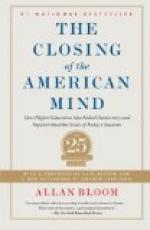Nevertheless, the reversion to narrower creeds but indicates the newly awakened hunger of the religious life. Men who sacrifice live with graver earnestness than those who are carelessly prosperous. Cynicism and pessimism are children of idleness and frivolity, never of heroic sacrifice and nobly accepted pain. These latter foster faith in life and its infinite and eternal meaning. Thus, with all the tragic submerging of our spiritual heritage the War involves, we may hope that it will cause a revival, not of emotional hysteria, but of deepened faith in the spirit, in the supreme worth of life, until at last we may see the dawn of the religion of humanity.
XI
THE WAR AND EDUCATION
Equally far-reaching are the changes the War must produce in our education. Temporarily, our higher institutions will be crippled by the drawing off of the youth of the land for war. This is one of the unfortunate sacrifices such a struggle involves. We must see to it that it is not carried too far. One still hears old men in the South pathetically say, “I missed my education because of the Civil War.” Let us strive to keep open our educational institutions and continue all our cultural activities, in spite of the drain and strain of the War. For never was intellectual guidance and leadership more needed than in the present crisis.
The paramount effect of the War on education is, however, in the multiplied demand for efficiency. This is the cry all across the country to-day, and, in the main, it is just. Our education has been too academic, too much molded by tradition. It must be more closely related to life and to the changed conditions of industry and commerce. Each boy and girl, youth and maiden, must leave the school able to take hold somewhere and make a significant contribution to the society of which he or she is an integral part. Vocational training must be greatly increased. The problems of the school must be increasingly practical problems, and thought and judgment must be trained to the solution of those problems. This is all a part of that socialization of democracy which must be achieved if democracy is to survive in the new world following the War.
There is, nevertheless, an element of emotional hysteria in the demand for efficiency and only efficiency. Efficiency is too narrow a standard by which to estimate anything concerning human conduct and character. In the effort to meet and conquer Germany, let us beware of the mistake of Germany. One of the world tragedies of this epoch is the way in which Germany has sacrificed her spiritual heritage, first for economic, then for purely military efficiency. When we recall that spiritual heritage, as previously described, when we think of Schiller, Herder and Goethe, Froebel, Herbart and Richter, Tauler, Luther and Schleiermacher, Kant, Fichte and Schopenhauer, Mozart, Beethoven and Wagner, we stand aghast at the way in which she has plunged it all into the abyss,—for what? Shall it profit a people, more than a man, if it gain the whole world and lose its own soul?




